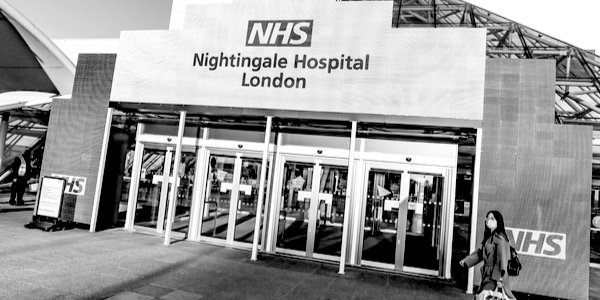We marked last month’s fifth anniversary of the imposition of lockdown on the British people by republishing some of our articles from that week. While the mainstream media were baying for stronger and longer restrictions, we were almost alone in criticising lockdown and showing that it would have catastrophic results for zero benefit. We continue to remind readers of the weeks – and the insane policies imposed on us – that followed. Today’s article was first published five years ago today, on April 28, 2020, under the heading ‘Empty hospitals and emptying care homes’.
BIRMINGHAM’S new Nightingale hospital, with capacity for 500 patients, has not admitted one in its first ten days.
The hospital’s chief executive Dr David Rosser said it was a ‘good thing’ that it had not been needed because it showed the NHS had absorbed the extra pressure.
He told the BBC: ‘It was never going to be a great thing to have to open this extra capacity because it didn’t come with new staff. And, of course, the more beds you open, the more you need to stretch.’
Perhaps the plan was to co-opt military medical personnel, since the military was responsible for erecting the emergency hospitals in record time; but in celebrating the ‘paradox’ of an empty hospital, Dr Rosser seems oblivious to the deeper truth that it actually reveals: that all this time, care home residents have been dying at a terrible rate, apparently barred from admission to hospital if they have symptoms of Covid-19. Now the NHS is appealing for those needing medical help to seek hospital treatment, as numbers attending A&E units have plummeted by around half in less than two months.
Presumably care home residents are exempt from this appeal on the grounds that they are putting too much pressure on the NHS – despite being the demographic most likely to suffer badly and die from Covid-19.
Questions have been asked by Lord Alton in a virtual House of Lords debate as to when care homes will be provided with adequate supplies of PPE and their staff routinely and regularly tested.
Urgent questions also need to be asked about the plight of the mentally disabled. According to Turning Point, which provides supported living and residential care for people with learning disabilities across the country, an unprecedented number of ‘Do Not Resuscitate’ forms have been received from doctors, which appear to have been carried out without consultation with patients or their families, and which they believe to be illegal. This is despite NHS England telling all primary care, community trust and acute CEOs on 3 April that any decisions on a treatment for people with learning disability and or autism should be made on an individual basis, guidance echoed by Health Secretary Matt Hancock. Julie Bass, chief executive of Turning Point, said: ‘Over the past two weeks we have come across more unlawful DNRs put in place for people who lack mental capacity than we would normally see in a year. We will always challenge these decisions robustly.’
Significantly, the craze for applying ‘autonomy’ to persons lacking mental capacity is such that their permission is often sought to apply normal standards of care and comfort; and yet it seems that someone else can decide that they will not be resuscitated if the need arises.
Given the official complacency about the fate of the weakest members of our society, it is difficult not to succumb to conspiracy theory, especially when the double standards are so blatant that they can hardly be regarded as secret. Is there a Government target for the number of old and disabled people who must die from coronavirus and related problems before the crisis is addressed?
Florence Nightingale, after whom the emergency hospitals are named, would not have stood by while the weakest and most vulnerable were condemned to death by prejudice. We need the lamplight of her compassion to illuminate the weaknesses and omissions as well as the successes; the crying need going unmet as well as the achievement; to highlight the scandal of the empty hospitals and the emptying care homes.











